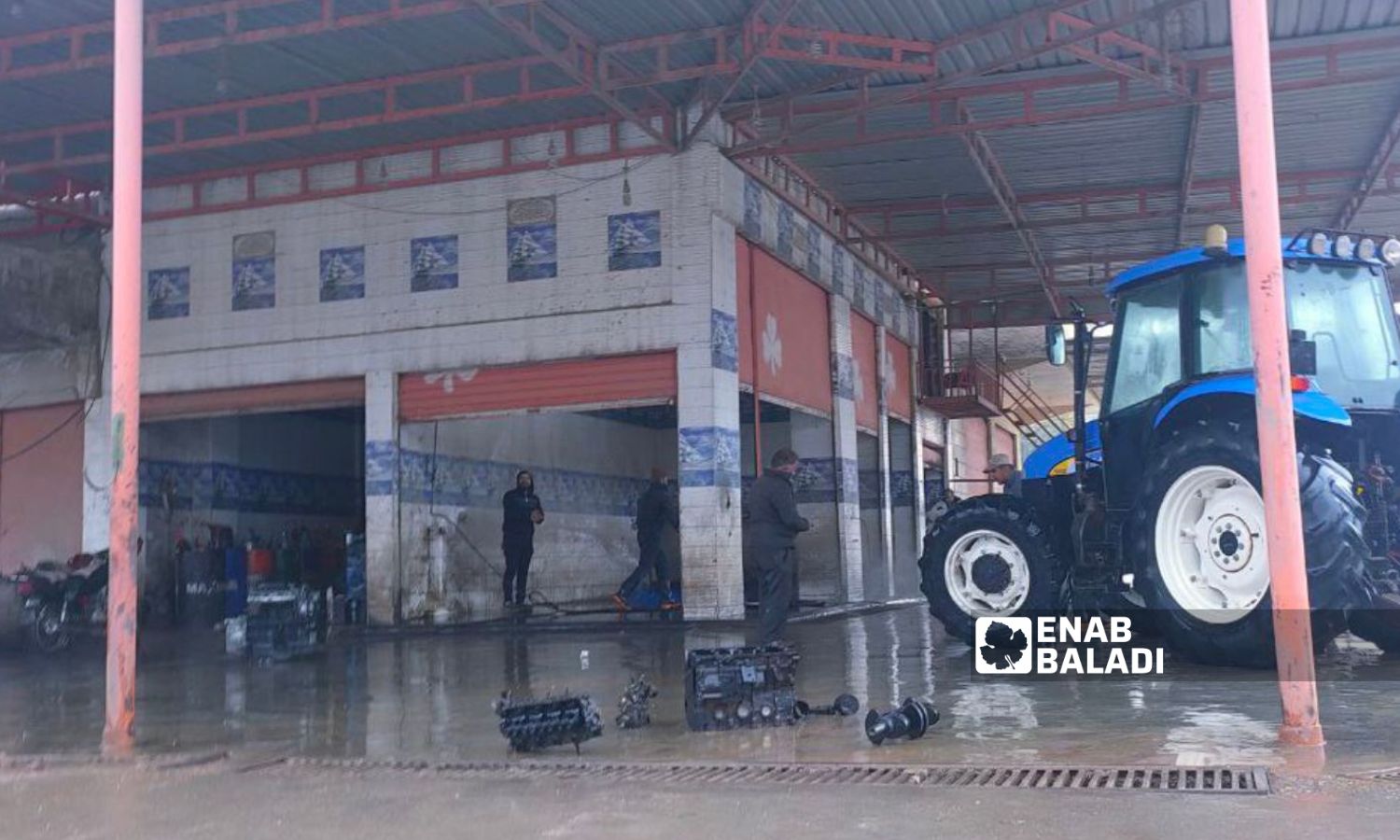



Qamishli – Majd al-Salem
Harvesters owners in al-Hasakah governorate, northeastern Syria, weeks ago began preparing and maintaining their machinery in preparation for the current harvest season amid high maintenance costs compared to previous years.
It is expected that the current wheat season will be good and better than the last two years, so the 48-year-old Riyadh al-Da’as is busy preparing and maintaining the harvester and the rest of the agricultural machinery that he works on, assisted by a group of seasonal workers, including drivers, technicians, and others.
Al-Da’as told Enab Baladi that the process of preparing the machines starts at the beginning of May and includes examining all parts of the harvester, especially the parts for threshing the ears and cleaning the grains and sieves, which cause huge losses to farmers in the event of technical problems that may lead to wastage of the harvested grains and ears.
According to a number of owners of agricultural machinery maintenance shops in al-Hasakah whom Enab Baladi interviewed, all spare parts are sold in dollars from different sources, some of which are local and another part comes from Manbij, Ain al-Arab, and Aleppo, and the prices of some types of them reach about $1000, according to the size and type of spare parts and its availability.
During the annual maintenance of the machines, damaged parts from previous harvests are replaced, mechanical parts are lubricated, and most importantly, adequate spare parts are secured throughout the season in anticipation of emergency breakdowns, which may stop the harvest for several days in the event of the inability to secure the spare part, which may create problems with the owners of the field, who always demand to speed up the harvesting operations for fear of fires.
Preparation for the harvest season does not only include mechanisms but also includes preparing workers, including drivers, technicians, porters, and cooks, all of whom will receive wages that amount to double what they earned during the past year as a result of the deterioration of the Syrian pound and the accompanying inflation and general rise in prices.
Najm Hussein, 50, owner of a harvester from the countryside of Tall Barak, told Enab Baladi that the most recent combine harvester in the region was manufactured in 2002, while there are combine harvesters manufactured in 1980, which makes most of them in the region dilapidated and in need of a lot of maintenance, whose full cost sometimes reaches $5,000, depending on the technical condition of the harvester and its age (year of making).
The preparation of the harvesters usually begins in March of each year, and their maintenance includes changing “skins, pellets, filters,” and others. Also, preparing the harvester depends on the land on which it will be harvested, whether it is irrigated or rain-fed, as well as replacing wheels and preparing spare wheels, according to Hussein.
During the current year, the mechanic’s wage ranges between $500 and $1,000, the harvester’s rent wage ranges between $500 and $700, and the wage of the cook accompanying the workers ranges between $200 and $400.
One of the problems facing the owners of the harvesters is the delay in the provision of fuel by the Autonomous Administration of North and East Syria (AANES), which forces them to buy diesel fuel from the black market at about 1,500 Syrian pounds per liter. ($1=8500 SYP, according to S-P Today, which covers the trading rate of the Syrian pound to the dollar).
One harvester consumes about a barrel of diesel every six hours in the case of continuous work, and the price of a barrel reaches about 300,000 Syrian pounds, while the Autonomous Administration allocates about 15,000 liters for each harvester, which is distributed in several batches during the season.
The harvester also needs an oil change every 72 hours of work at a price of $500 per barrel of oil.
A number of harvesters’ owners whom Enab Baladi met demanded that the relevant authorities determine harvest fees at a minimum of 5% of the production of irrigated crops and about 8% of the production of rain-fed crops so that they would have the ability to pay the costs and wages of maintenance and workers and achieve a good profit margin, as they said.
The areas cultivated with irrigated wheat amount to about 4,510,112 dunams and 209,875 dunams of rain-fed wheat, during the current season, according to the media office of the AANES’s Agricultural Authority, while the areas of land cultivated with irrigated barley reach about 900 dunams, and with rain-fed barley to about 813,281 dunams.
if you think the article contain wrong information or you have additional details Send Correction